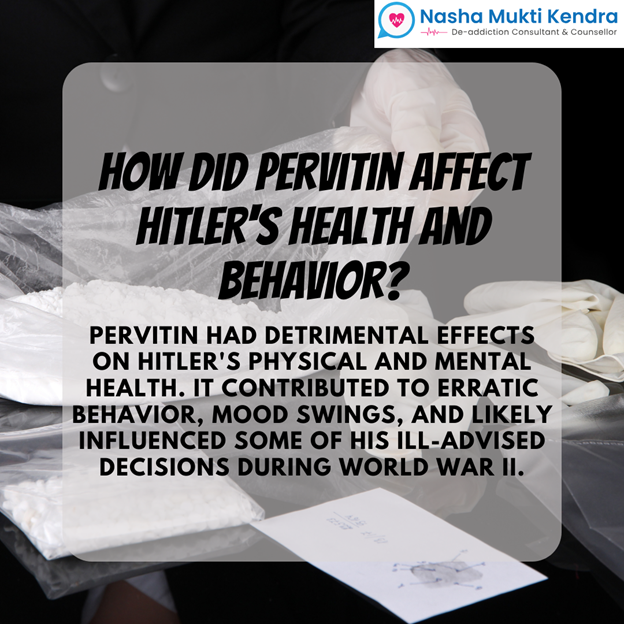In the annals of history, Adolf Hitler’s reign as the dictator of Nazi Germany stands out as one of the darkest chapters. Not only did he orchestrate the Holocaust and initiate World War II, but it is also widely believed that he was heavily reliant on a potent and insidious substance known as a “speed drug” to maintain his stamina and focus throughout his tyrannical rule. This drug, a pure form of amphetamine, was at the heart of Hitler’s daily regimen, and its use had profound implications for his health, decision-making, and ultimately, the world.
The Pure Speed Drug: What Was It?
The drug that fueled Hitler’s infamous rants and manic energy was a form of amphetamine, a powerful central nervous system stimulant. Hitler’s preferred amphetamine was Pervitin, a brand name for methamphetamine, which is colloquially known as “meth.” Pervitin, known as “the miracle drug,” was marketed as a remedy for a wide range of ailments, from fatigue to depression, making it easily accessible to the general public in pre-war Germany.
The use of Pervitin as a “performance-enhancing” drug was not limited to Hitler; it was also widely distributed to German soldiers during World War II to boost their endurance on the battlefield. This practice highlights the drug’s pervasiveness and the extent to which it was integrated into Nazi Germany’s war effort.
What is in the Drug Speed?
Methamphetamine, commonly referred to as “meth” or “speed” on the streets, is a synthetic drug that stimulates the central nervous system. It works by increasing the release and inhibiting the reuptake of certain neurotransmitters, such as dopamine and norepinephrine, in the brain. This leads to heightened alertness, increased energy, and a sense of euphoria.
In the case of Pervitin, the methamphetamine was typically administered in the form of a small pill. The drug was intended to provide an energy boost, suppress appetite, and enhance concentration. Hitler, in particular, used it to maintain his grueling work schedule, which often extended late into the night. By taking Pervitin, he could stay awake for hours on end, holding meetings, issuing orders, and plotting military strategies.
The Risks of Hitler’s Speed Addiction
While Pervitin may have temporarily boosted Hitler’s energy and alertness, it came at a tremendous cost to his health and well-being. The risks associated with methamphetamine use are well-documented and include a range of physical and psychological side effects.
1. Physical Health Risks:
Methamphetamine abuse can lead to a host of physical health problems, including:
- Cardiovascular Issues: Methamphetamine raises heart rate and blood pressure, increasing the risk of heart attack and stroke.
- Dental Problems: The drug’s impact on saliva production can lead to severe dental decay, commonly referred to as “meth mouth.”
- Weight Loss: Methamphetamine is an appetite suppressant, often leading to significant and unhealthy weight loss.
- Skin Issues: Users may develop skin problems such as acne and rashes due to the drug’s impact on blood flow and the immune system.
2. Psychological Risks:
The psychological risks of methamphetamine use are equally concerning, including:
- Addiction: Methamphetamine is highly addictive, and frequent use can lead to a rapid development of dependence.
- Psychosis: Prolonged use can result in symptoms of psychosis, including hallucinations, paranoia, and delusional thinking.
- Mood Swings: Users often experience severe mood swings, including intense periods of anxiety, depression, and aggression.
- Cognitive Impairment: Chronic use can impair cognitive function, leading to memory problems and difficulty with decision-making.
For Hitler, the psychological toll of Pervitin use likely contributed to his increasingly erratic behavior and irrational decision-making as the war progressed.
The Impact on History
Hitler’s dependence on Pervitin had far-reaching consequences. The drug fueled his relentless pursuit of military campaigns, including the ill-fated invasion of the Soviet Union in 1941. It’s been suggested that Pervitin may have played a role in some of Hitler’s most catastrophic decisions, as it can induce a false sense of confidence and invincibility.
Furthermore, the widespread use of Pervitin among German soldiers had detrimental effects on their health and combat effectiveness. Many soldiers became addicted to the drug, leading to a decline in morale and discipline. The long-term impact of this addiction on veterans is still a subject of research and concern.
The Legacy of Hitler’s Speed Drug
The legacy of Hitler’s dependence on a pure speed drug like Pervitin serves as a stark reminder of the dangers associated with substance abuse. His addiction not only influenced his actions but also the course of history. It underscores the power of addiction to cloud judgment, exacerbates existing mental health issues, and leads to catastrophic consequences on a global scale.
In modern times, the use of amphetamines as performance-enhancing drugs remains a concern, particularly in sports and academic settings. The lessons learned from Hitler’s reliance on Pervitin should serve as a cautionary tale about the destructive potential of such substances.
How can Nasha Mukti Kendra help?
Nasha Mukti Kendra plays a vital role in assisting individuals grappling with addiction to speed drugs. We pride ourselves on offering tailored and effective treatment options, ensuring that each individual receives the best possible care for their unique needs. Our dedicated team of professionals, including experienced psychologists, is committed to facilitating the recovery journey.
At Nasha Mukti Kendra in Dehradun, we understand that addiction is a complex and deeply personal struggle. That’s why we provide personalized treatment plans that address the specific challenges and circumstances of each individual. We believe in a holistic approach to recovery, encompassing physical, psychological, and emotional aspects.
Our team of highly skilled psychologists employs an American-based therapy known as Love & Care therapy. This therapeutic approach emphasizes empathy, compassion, and understanding as key components of the recovery process. Love & Care therapy promotes a nurturing and supportive environment where individuals can explore the root causes of their addiction, confront underlying issues, and develop healthier coping mechanisms.
